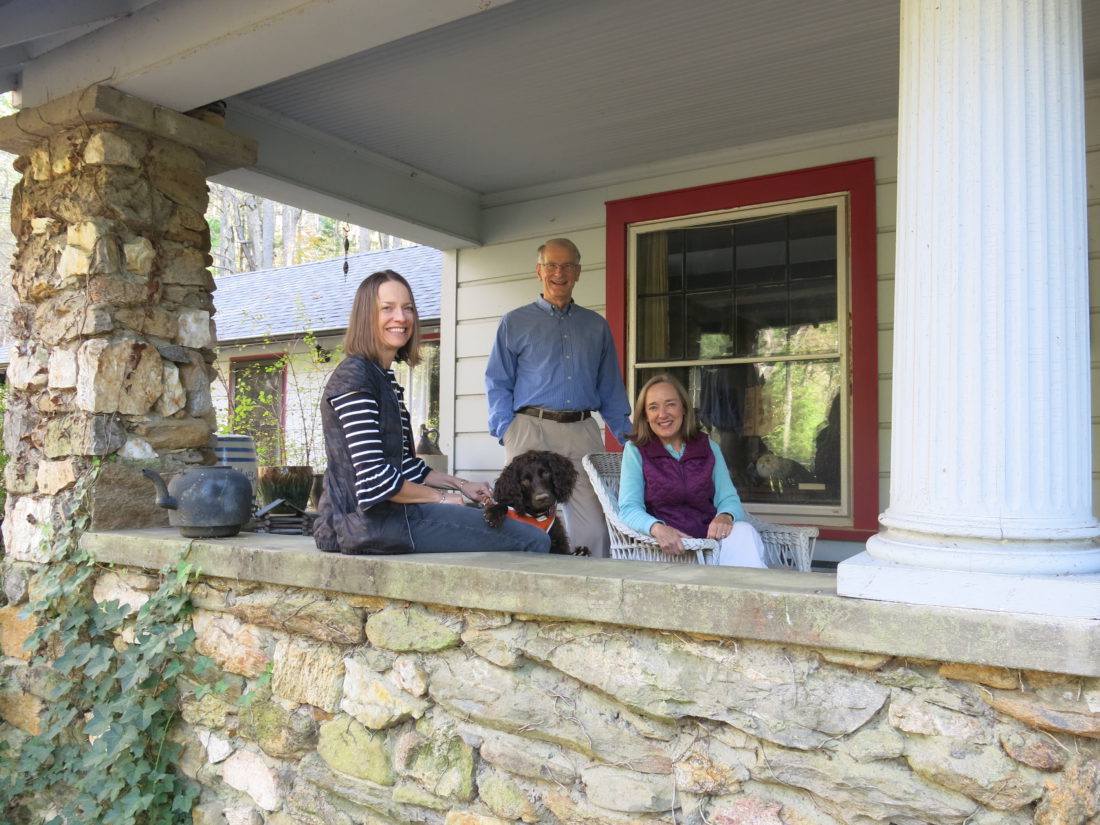Near the end of her life, author Wilma Dykeman was preoccupied. “She kept asking me, ‘What’s going to become of the house?’” remembers her son Jim Stokely, who serves as president of the nonprofit Wilma Dykeman Legacy.
The three-bedroom property, located on 11 acres in Beaverdam, was Dykeman’s childhood home.
“She wanted to make sure that ‘The Place,’ as she and her mother referred to it as, would be preserved in some way,” Stokely continues.
Since Dykeman’s death in late 2006, Stokely, along with his wife, Anne, and brother, Dykeman, have worked to fulfill their mother’s wish as well as celebrate her literary career, which included authoring 15 works of nonfiction and three novels.
A decade later, and with support from several local organizations and individuals, the property is now the new home for UNC Asheville’s writer-in-residence program, an interdisciplinary initiative set to launch in fall 2021.
“Everything takes time if you’re going to do it right,” Stokely says. “And I think we did it right.”
Discovering Dykeman
Local investor and philanthropist Ellen Carr was key to getting it right. She’s also emblematic of both Stokely’s hope and fear for his mother’s legacy. Because, although Dykeman is remembered by many lifelong residents in Asheville, her literary contributions are less known among recent transplants and readers outside Western North Carolina.
Carr, who relocated to the area by way of Nashville in 2012, says her own introduction to Dykeman was by chance. “I kind of stumbled across Wilma’s The French Broad because that’s her one book that’s most prominently displayed at Malaprop’s,” she explains. Published in 1955, the work combines regional history with environmental studies. (For more, see “Asheville Archives: Early Reviews of Wilma Dykeman’s ‘The French Broad,’ 1955,” Nov. 18, Xpress)
Impressed by Dykeman’s prose, Carr went on to read all three of the author’s novels. “I just really loved her writing and kind of scratched my head and thought, ‘Why didn’t I ever get exposed to her before?’”
Carr, who now serves on the Wilma Dykeman Legacy board, purchased the author’s childhood home in September 2019, putting into effect the conservation easements from both RiverLink and the Preservation Society of Asheville and Buncombe County that were part of the purchase agreement. A year later, she donated the property to UNCA.
“I just thought it would be a great addition to the community,” Carr says. “It’ll provide people a chance to find that sort of creative community that is so important in maintaining a thriving literary tradition.”
The brightest star
Currently, the university’s plans for the program are still in development. During a recent virtual press conference, UNCA Chancellor Nancy J. Cable said one major hope is to have the property operating year-round. Ideally, visiting writers will live in the home during the fall and spring semesters; in the summer, the space may host conferences and other literary events.
Carr, who is among the members of the writer-in-residence selection committee, stresses the program’s interdisciplinary approach. “This is not an English department or creative writing department endeavor,” she says. The group will work to select a diverse range of writers each year, she maintains, inviting historians, environmentalists, journalists and authors alike to temporarily call the Dykeman house their home.
In doing so, the program honors the many hats that Dykeman wore throughout her life. Along with her publications, the author and environmental activist taught creative writing and Appalachian literature at the University of Tennessee, while serving as the Volunteer State historian for over two decades.
Regrettably, most of her contributions were overlooked, according to Stokely. “She dealt with injustice her whole life,” he explains. “Being a woman who worked in multiple fields dominated by men, she was used to ill treatment.”
Because of this overt sexism, Stokely continues, he views the writer-in-residence program partly as a way to propel his mother’s name beyond the mountains of WNC.
“It promises to be a bright star in the constellation of things that the Wilma Dykeman Legacy has done,” Stokely says of the home’s next chapter. “And it could be the brightest star in attracting world-class writers and broadening Wilma’s recognition across the United States and all around the world.”






Before you comment
The comments section is here to provide a platform for civil dialogue on the issues we face together as a local community. Xpress is committed to offering this platform for all voices, but when the tone of the discussion gets nasty or strays off topic, we believe many people choose not to participate. Xpress editors are determined to moderate comments to ensure a constructive interchange is maintained. All comments judged not to be in keeping with the spirit of civil discourse will be removed and repeat violators will be banned. See here for our terms of service. Thank you for being part of this effort to promote respectful discussion.